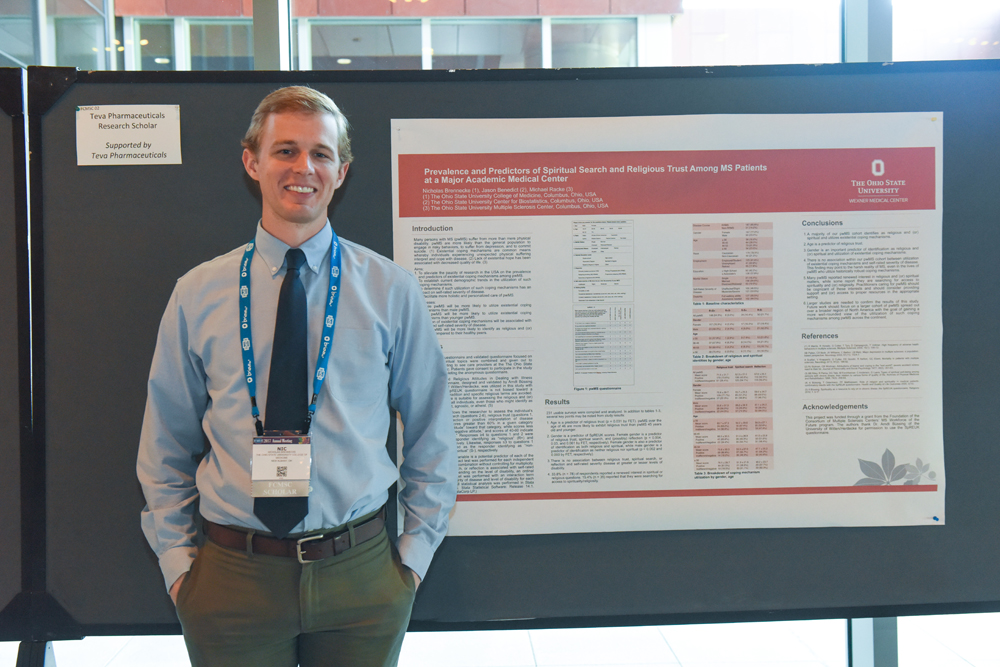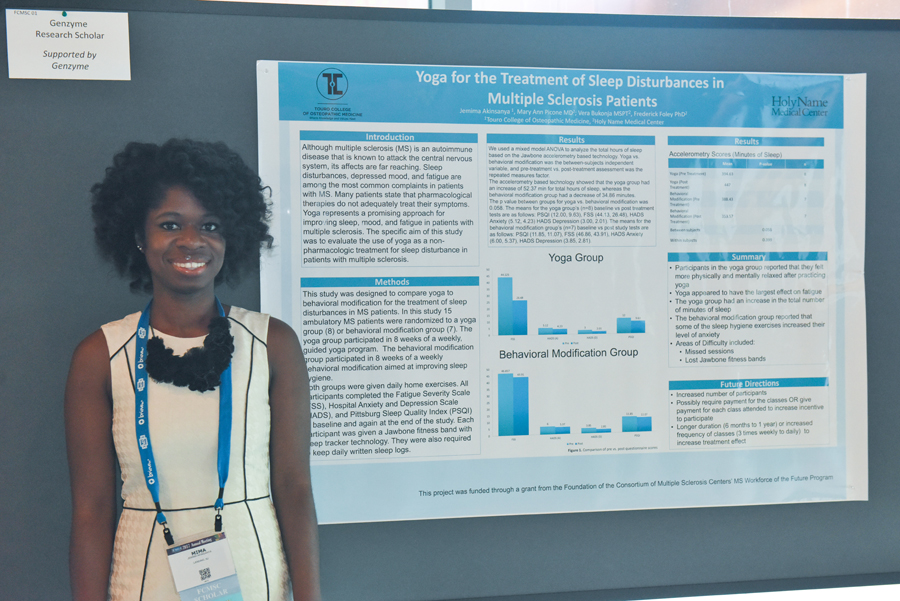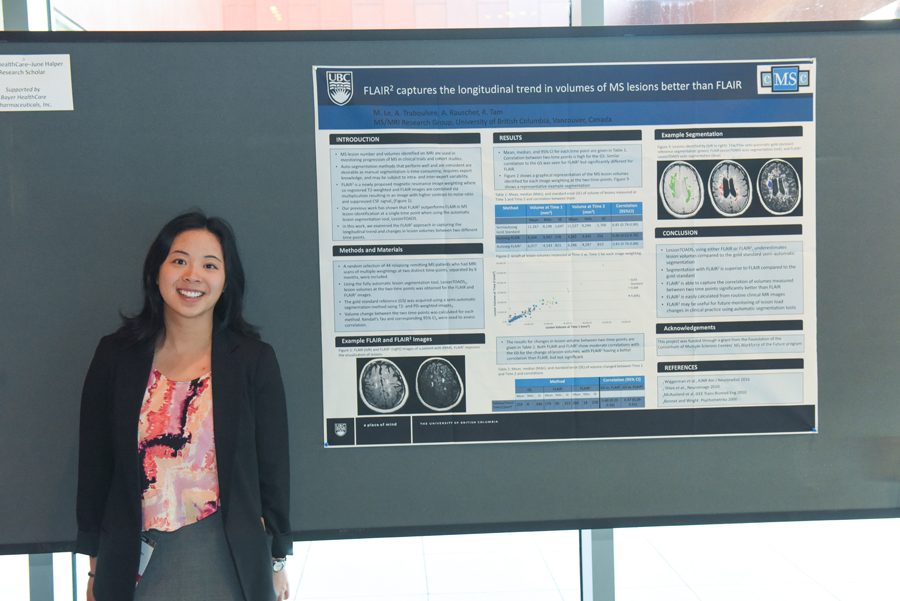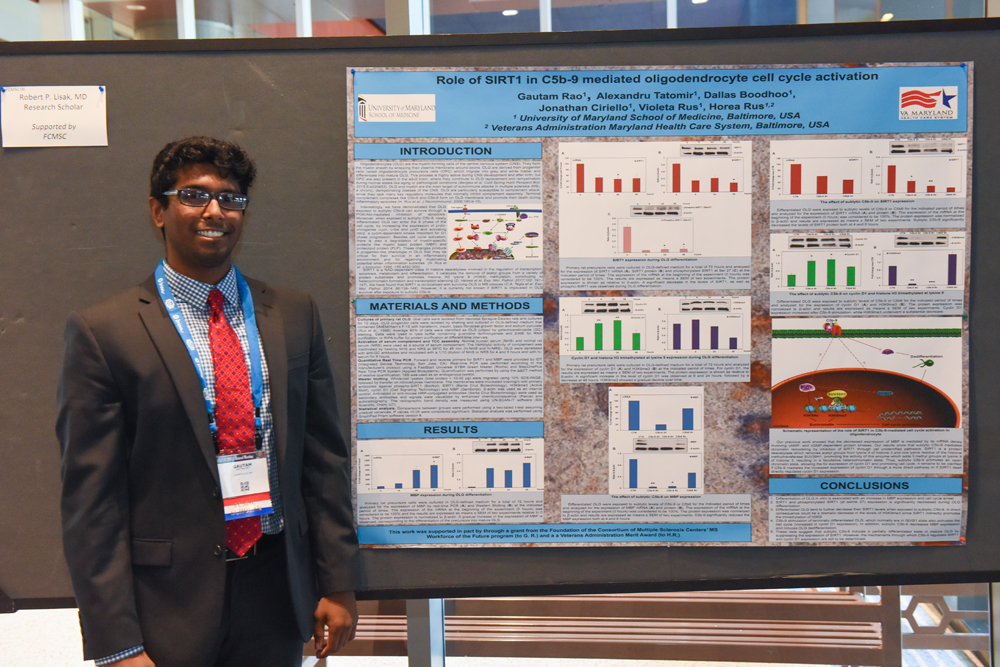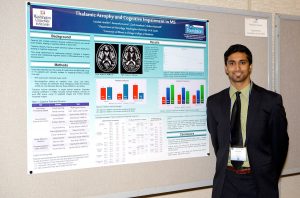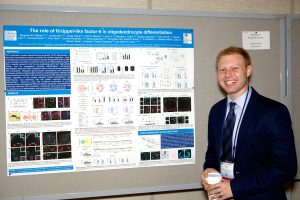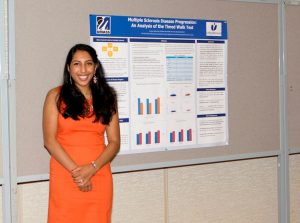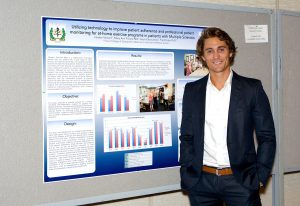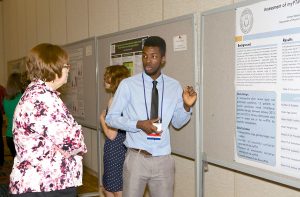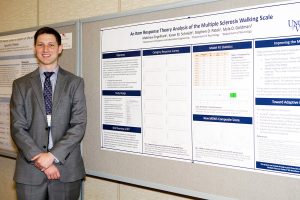Medical Student Research Scholars Narratives
Nicholas Brennecke, MD
Medical Research Student Scholar and Presenter
Project Title: Prevalence and Predictors of Spiritual Search and Religious Trust Among MS Patients at a Major Academic Medical Center
Project Mentor: Michael Racke, MD
Perhaps the most important knowledge gained from this research project was a better grasp of a proper approach to robust clinical research. From my mentor Dr. Racke. I learned to analyze my own results realistically to compare my results with previous work on the topic and to glean all that I can from all data collected. These lessons learned have been invaluable. I am also impressed by the impact that one mentor can have on the career path of a mentee.
I am so grateful for the support of the FCMSC to conduct clinical research related to MS and to attend the CMSC annual meeting. This project brought together my broad interest with regard to a topic related to MS and cemented my interest in MS. Attending the conference and presenting my research was yet another confirmatory factor in my path toward Neurology/MS.
I am a PGY-1 Adult Neurology resident at Case Western/University Hospitals Cleveland Medical Center.
Jemima Akinsanya, MD
Medical Research Student Scholar and Presenter
Project Title: Yoga for the Treatment of Sleep Disturbances in Multiple Sclerosis Patients
Project Mentor: Mary Ann Picone, MD
During my mentorship I learned the importance of tailoring treatment to a patient’s individual needs. Since MS has such multifaceted effects, my mentor taught me that as a provider it is important to think outside the box on ways to better improve patients’ quality of life. I also learned how vital it is to have a strong therapeutic alliance with a patient.
It was a great experience being able to present my project and answer questions about it. It was also great to network with other residents. I learned about different programs available for residents interested in MS.
I am a second year neurology resident at Emory and working on starting a new research project with the MS department this year.
Megan Le
Medical Research Student Scholar and Presenter
Project Title: Longitudinal study examining the relationship between FLAIR’2 and disability status in MS patients
Project Mentor: Anthony Traboulsee, BSc, MD
The MS research mentorship was an extremely valuable experience that will help me become a better clinician and researcher. Learning how to come up with a research hypothesis and text it is something that can only be taught through experience and with the guidance of experience researchers.
I really enjoyed the scholar’s luncheon as it was a great opportunity to meet fellow medical students as well as residents who are involved in the FCMSC. Being able to present my poster at a large conference was also extremely valuable learning opportunity.
I will continue my studies at University of British Columbia.
Gautam Rao
Medical Research Student Scholar and Presenter
Project Title: Role of Histone Deacetylase SIRT1 in Oligodendrocyte Survival in Multiple Sclerosis
Project Mentor: Horea G. Rus, MD, PhD
My project entailed more of the biomolecular aspect of oligodendrocyte function and repair and this experience allowed me to get a better grasp at the specific process of disease and helped me understand the different treatment modalities available.
Attending the lectures at the CMSC Annual meeting was very informative in understanding the current guidelines and research occurring in MS research.
I am in my third year of medical school and will most likely apply for neurology residency.
Vaishak Amblee,
FCMSC Research Scholar
Vaishak Amblee, 2014 FCMSC Research Scholar presenting his project at 2015 Annual Meeting in Indianapolis, IN, 3rd year medical student at University of Illinois at Chicago College of Medicine.
Project Title: Cognition and Early Thalamic Atrophy.
Project Mentor: Robert Naismith, MD.
How will your presentation and participation at the CMSC Annual Meeting assist you pursuing your chosen career path?
I made new connections with some of the residency program coordinators and directors that I think will be helpful for my future professional goals.
What knowledge did you gain during your mentorship that you believe will contribute to your current or future professional growth?
Shadowing my mentor allowed me to gain meaningful insight into the clinical aspects of neurology and also into the clinical and research aspect of MS care. Through my research and clinic rotations I was able to appreciate the wide variety of MS patients, the diversity of their individual disease pattern, and the personalized care that had to be tailored to their needs.
Benjamin Laitman,
FCMSC/Genentech Corporation Research Scholar
Benjamin Laitman presenting his project at the 2015 Annual Meeting in Indianapolis, IN, PhD candidate in Neuroscience.
Project Title: Kruppel-Like Factor-6 Integrates Promyelinating Inputs to the Oligodendrocyte Differentiation Program, and is Essential for CNS Myelination.
Project Mentor: Gareth John, VetMB, PhD.
What is your personal evaluation of this experience in multiple sclerosis?
This experience allowed me to really get a good understanding of some of the basic mechanisms behind a disease which has affected family and friends of mine. I am proud to be contributing and presenting on such a topic and hope this will serve as a step for me in pursuing this field as a career in the future.
How will your presentation and participation at the CMSC Annual Meeting assist you pursuing your chosen career path?
Since most of my focus of my MS research has largely been bench research, participating in this meeting allowed me to see more of the clinical projects/ideas out there in the MS field. I was able to connect with MS clinicians at my institution and others that will hopefully be long-lasting relationships as I progress in my career.
What were the most valuable learning experiences related to MS derived from your research project experience?
I was able to delve into a very basic question in MS research, giving me an appreciation for the complexity of this disease.
Jyotsna Mullur,
FCMSC/Acorda Therapeutics, Inc./Steven R. Schwid, MD Memorial Research Scholar
Jyotsna Mullur presented her project at the 2015 Annual Meeting in Indianapolis, IN, 4th year medical student at University of Massachusetts Medical School.
Project Title: Analysis of the 25 Foot Timed Walk Test as a Predictive Factor in Multiple Sclerosis.
Project Mentor: Carolina Ionete, MD, PhD and Peter Riskind, MD, PhD.
What is your personal evaluation of this experience in Multiple Sclerosis?
This experience studying multiple sclerosis provided me with an immersive and in depth education in the field of neuroimmunology, a field that was intensely fascinating to me due to its interdisciplinary approach. I enjoyed the wide breadth of study, from the nuances of brain chemistry, but also to the more tangible markers of patient disability. Making these connections was a crucial part of my learning experience, and was fundamental in helping me clarify my desire to pursue a career as a neurologist. My mentors were dedicated to my education and my success, and i am grateful for their guidance. This experience has been one of the most rewarding parts of my medical school career, and I feel privileged and honored to have been given the opportunity to study a subject which I have become passionate about.
How will your presentation and participation at the CMSC Annual Meeting assist you pursuing your chosen career path?
It was a valuable opportunity to present at an international conference, learn from leading investigators in the field, and improve in research methods.
Hunter Vincent,
FCMSC/June Halper Research Scholar
Hunter Vincent presenting his project at the 2015 Annual Meeting in Indianapolis, IN.
Project Title: Utilizing Technology to Improve Patient Adherence and Professional Patient Monitoring for At-Home Exercise Program in Patients with Multiple Sclerosis.
Project Mentor: Mary Ann Picone, MD.
What knowledge did you gain during your mentorship that you believe will contribute to your current or future professional growth?
I gained valuable experience in patient interaction. Learning to balance medical, psychological, and physician therapy knowledge to provide well-rounded patient care.
What is your personal evaluation of this experience in multiple Sclerosis?
I believe this Remote-Monitored Tele Relay program can potentially change how we treat MS patients and provide patient care to patients.
Lukmon Babajide,
FCMSC Research Scholar
Lukmon Babajide presented his project at the 2015 Annual Meeting in Indianapolis, IN, Third year medical student at UT Southwestern Medical School.
Project Title: Effectiveness of Medtronic Intrathecal Drug Delivery Pump Personal Therapy Manager in Spasticity Management (MPTM).
Project Mentor: Fatma Gul, MMM.
How will your presentation and participation at the CMSC Annual Meeting assist your pursuing your chosen career path?
It gives me more exposure in the fields that I am interested in as well as giving me a glimpse of the types of advocacy work that go on within those fields.
What is your personal evaluation of your mentorship experience in multiple sclerosis?
Working with patients that have MS have been an eye opening experience. The determination of these patients, the psycho-social issues that they face, and the hurdles that they go through just to get a simple care are astounding. I am truly happy that I had this experience because it has taught me so much about a community (a rather organized community) that I didn’t really know about before.
Matthew Engelhard, MD
FCMSC Research Scholar
Matt Engelhard presented his project at the 2015 Annual Meeting in Indianapolis, IN.
2016 PhD candidate at the University of Virginia with my research focused on detection and monitoring of walking impairment and other MS symptoms using smart devices.
Project Title: An Item Theory Based Evaluation of Multiple Sclerosis Walking Scale.
Project Mentor: Myla Goldman, MD, MSc.
What knowledge did you gain during your mentorship that you believe will contribute to your current or future professional growth?
There’s too much to name. Dr. Goldman has taught me how to build, create and submit an IRB protocol, then run it, down to the last detail. She taught me how to evaluate disability in MS using a combination of assessments, including the neurological exam, timed walks, MS functional composite, and patient reported outcome measure. She’s helped me to understand how to analyze data, put results in context, and present them to a clinical audience. This is far from a complete list. In short, she’s single-handedly taught me how to do clinical research. I now feel well-equipped to do clinical research on my own.
Please describe the sessions or activities of most professional value to you during the CMSC Annual Meeting.
The scholar recognition luncheon had the most value to me, because it gave me the opportunities to get feedback on my research and connect to others with similar interests. I was even able to identify a potential collaboration. There were so many opportunities to learn and generate ideas at the meeting. Two memorable sessions were the dinner on social media in MS care, and the session on robotics and prosthetics in rehab.
How will your presentation and participation at the CMSC Annual Meeting assist you pursuing your chose career path?
It takes time to learn how to effectively communicate research ideas and findings, so I find it helpful to practice putting together a poster and presenting it to other researchers and clinicians. Since I intend to continue with MS research over the long term, these connections will be an asset as time goes on. Further, the sessions are a great source of new, different ideas, providing a nice supplement to my day-to-day education.

